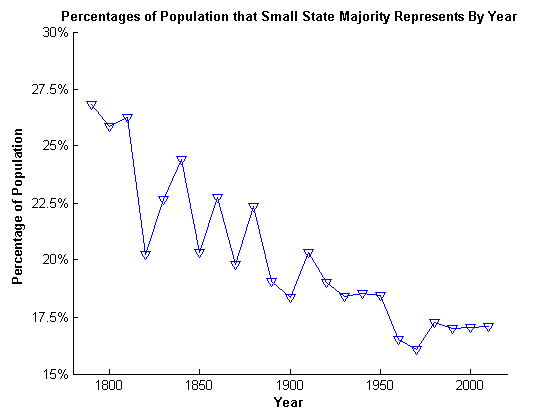Over the past five weeks, this blog has presented a variety of shortcomings of the Senate. Among these problems are unequal representation among states, marginalization of minority groups, a filibuster that is too easily invoked, a consistent bias towards one political party, and a disproportionate amount of federal funds and power received by small states. Many political observers have noticed these problems with the Senate, but the question remains of what should be done to fix them. This article will present several solutions to deal with the problems of the United States Senate.
Solution 1: Eliminate the Senate
Eliminating the Senate would immediately solve all of the problems which previous posts covered. This reform would also allow the government to function more quickly and efficiently. The unicameral legislature has a strong track record, and many national governments use a unicameral legislature, including Taiwan, South Korea, Denmark, Finland, Iceland, Sweden, Norway, Greece, Bulgaria, Costa Rica, Israel, Turkey, Venezuela and Cameroon, among many others. The state of Nebraska and every Canadian province all use unicameral legislatures as well. These countries and states have used unicameral legislatures without major problems. In fact, the Scandinavian countries have the highest levels of human development in the world, and Taiwan and South Korea are powerhouses in the technology sector. Some have argued that most unicameral legislatures with unicameral legislatures are small and relatively homogeneous, which consequently makes them more governable. All countries with unicameral legislatures are either smaller or more homogeneous than the US, but so is almost every other country in the world. New Zealand, Singapore and Turkey have unicameral legislatures and roughly about the same level of diversity as the US does, and they are among the most advanced in the world. Bangladesh has half the population that the US does and the Jatiyo Sangshad only consists of one house. The US has no equivalent in the world in terms of population and diversity, so these parameters are not a basis on which to claim that a unicameral legislature would not work in this country.
However, the Senate does serve a role in filtering out extreme legislation from the House of Representatives. To allay fears that too many irresponsible laws would be passed without the upper house of Congress, a commission could be created to oversee laws that the House of Representatives passes. Robert Nelson, a professor in the School of Public Policy at the University of Maryland, has made that recommendation, among many others in the Philosophy and Public Policy Quarterly.
Solution 2: Reduce Power of Senate
Another solution to deal with the Senate is to reduce the institution’s power by a large degree. Filibusters and holds should be abolished, and the Senate would take more of an advisory role, requiring perhaps a 2/3rds majority to reject legislation from the House. The Senate could still perform most other functions, such as approving Supreme Court Justices, cabinet officials and treaties. Reforms of this nature would also be easier to pass than complete abolition of the Senate, so strategically they may be more worthwhile to pursue. Merely outlawing filibusters and holds would increase the efficiency of Congress a great deal. Since most of the problems with the Senate have to do with delaying legislation or diverting funds to their states, reducing the power of the Senate a great deal would ameliorate much of the unfairness of the current system.
Solution 3: Give Larger States More Seats
A new allocation of Senators based on population would also solve many of the problems with the Senate. If each state received a number of Senators based on their population, there would be no unfairness between smaller and larger states, far less marginalization of minorities, and no way for small states to obtain an extraordinary amount of funds from the federal government. The Senate could keep its six-year terms and staggered elections; these would act as a buffer in case the House of Representatives became filled with radicals after an election.
The figure below shows the percentage of the population that the smallest states in the US contain who can form a majority in the Senate. That number has dropped from roughly 27% when the country was established, to 18% today. The Senate’s compromise of equal representation for each state was a bad idea at the country’s inception and has become more absurd over time. Now Senators in small states are able to use this imbalance to their advantage and stay in office for decades.
 The following figure shows the population ratio between the most and least populous states from 1790 to 2010. The ratio was only 12:1 in 1790, but rose to 172:1 when many sparse territories were added to the Union. As people migrated to fill the new states, this ratio has steadily declined, but has held roughly constant at approximately 65:1 for the past 40 years. This is a ridiculous state of affairs and is an ample reason to distribute Senators based on population and not by state.
The following figure shows the population ratio between the most and least populous states from 1790 to 2010. The ratio was only 12:1 in 1790, but rose to 172:1 when many sparse territories were added to the Union. As people migrated to fill the new states, this ratio has steadily declined, but has held roughly constant at approximately 65:1 for the past 40 years. This is a ridiculous state of affairs and is an ample reason to distribute Senators based on population and not by state.
 All of the solutions presented in this post revolve around the current reality in the US that state boundaries are not as important as they once were. In 1790, American states were quite independent, having been colonies of Great Britain only 15 years earlier. At that time, many Americans gave their allegiances to their state above their country. However, the US is an enormously different place now. Culture in the United States has become more homogeneous over the states and people regularly migrate across state boundaries. Robert Nelson describes the current situation perfectly:
All of the solutions presented in this post revolve around the current reality in the US that state boundaries are not as important as they once were. In 1790, American states were quite independent, having been colonies of Great Britain only 15 years earlier. At that time, many Americans gave their allegiances to their state above their country. However, the US is an enormously different place now. Culture in the United States has become more homogeneous over the states and people regularly migrate across state boundaries. Robert Nelson describes the current situation perfectly:
“Until 1913 senators were chosen by state legislatures, giving senators the distinctive role of “ambassadors” for their states. But today senators from smaller states take advantage of their disproportionate political leverage to win pork barrel projects and capture other large “political rents” for their home states. Yet with the current ease of national transportation and communications, wide internal migration among the states, and the rise of federal governing responsibility, the states now play a smaller role in the life of the nation. The Senate is no longer needed.”
The Senate’s rules of representation were created to bring as many colonies into the Union as possible. For that reason, the founders of the country gave the benefit of equal representation regardless of state population to the smaller colonies. The founders made this compromise because there was some uncertainty over whether all the colonies would join the US or would split into smaller countries. Now that the US has established itself beyond a reasonable doubt and people are citizens of the US first and individual states second, this compromise is no longer needed. We should apportion representation equally across all states and remove barriers to government efficiency. We need to recognize our unity as a country and move forward together.
